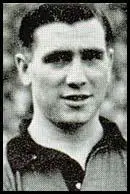Bill Shorthouse

William (Bill) Shorthouse was born in Bilston on 27th May, 1922. He joined the British Army during the Second World War. He was badly wounded in the arm during the D-Day landings but recovered his fitness and joined Wolverhampton Wanderers in April 1946.
Shorthouse joined a team that included Johnny Hancocks, Sammy Smythe, Jesse Pye, Jimmy Dunn, Jimmy Mullen, Billy Crook, Roy Pritchard, Billy Wright, Bert Williams, Bill Shorthouse and Terry Springthorpe. Initially a centre-half, he later moved to full-back.
Despite taking Wolves to third place in the 1946-47 season Ted Vizard was replaced by his assistant Stan Cullis in June 1948. The following year Cullis led Wolves to the FA Cup final against Leicester City. Wolves won the game 3-1 with Jesse Pye scoring two goals in the first-half and Sammy Smythe netting another in the 68th minute.
The following season Wolves finished in 2nd place in the First Division. Wolves finished 3rd in 1952-53 and won the title in 1953-54 season. Shorthouse missed only two games that year. Bert Williams claimed that Shorthouse was "straight-forward with no frills, but very hard and gave everything he'd got for the Wolves. He should have played for England."
The football journalist, Ivan Ponting, wrote that "Shorthouse... stood out as a hard man in a hard side, tackling like a runaway steamroller, positioning himself shrewdly, and passing simply and sensibly to team-mates blessed with skills more creative than his own... Above all, he was phenomenally dependable, which was reflected by his extraordinary record of never being dropped (his only absences came through injury or illness) from the moment he earned a regular place, during the 1947-48 season, until he bowed out, in his mid-thirties, in 1956-57."
After playing in 376 cup and league games for the club Shorthouse retired from professional football in 1956 he became a coach, helping develop the young footballers of at Aston Villa as well as the England youth team.
Shorthouse became a coach at Birmingham City after Stan Cullis was appointed manager of Birmingham City in December 1965. At the time the club was struggling in the Second Division. For a short period Shorthouse was a caretaker manager of the club after Cullis retired in March 1970.
Bill Shorthouse died in a nursing home on 6th September 2008 after suffering from dementia for several years.
Primary Sources
(1) Ivan Ponting, The Independent (18th September, 2008)
Shorthouse was vastly influential as Wolves, under the iron guidance of Stan Cullis, won the FA Cup in 1949, followed by the League Championship five years later. However, veteran denizens of Molineux maintain that those twin peaks only begin to reflect the full glory of an exceptional team. They would maintain that an even more memorable achievement was Wolves' blazing of a trail for British clubs in Europe, when they embarked on a series of floodlit matches against many of the continent's top performers...
There were no frills about Shorthouse. Rather, he stood out as a hard man in a hard side, tackling like a runaway steamroller, positioning himself shrewdly, and passing simply and sensibly to team-mates blessed with skills more creative than his own. He was not particularly big, but he was remarkably strong and his fellow Wolves were invariably desperate to be on his side in the often volcanically-contested training matches in the old car park behind Molineux.
Above all, he was phenomenally dependable, which was reflected by his extraordinary record of never being dropped (his only absences came through injury or illness) from the moment he earned a regular place, during the 1947-48 season, until he bowed out, in his mid-thirties, in 1956-57...
Nicknamed "The Baron" for the imperious manner in which he presided over his area of the pitch, Shorthouse was appealingly unassuming away from the action and a dedicated professional who neither smoked nor drank...
Bill Shorthouse never played for his country, but many a footballing friend and foe will maintain stoutly that he was the equal of plenty who did.
